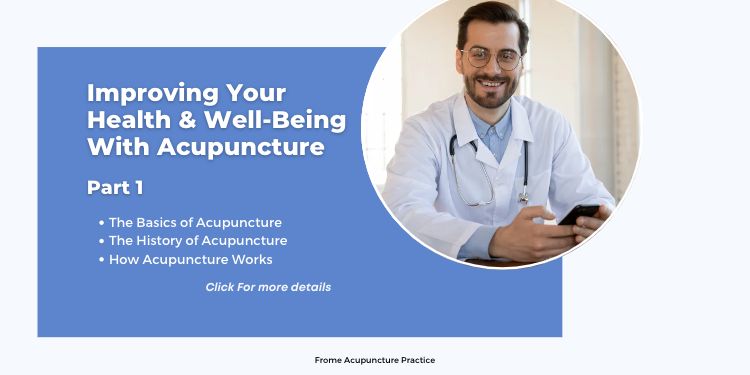1.Acupuncture Fundamentals
Acupuncture is a form of complementary medicine that began in China over 2000 years ago. It is founded on the notion that vital energy, or Qi, runs through the body via paths known as meridians. When Qi flows freely and in harmony, the body is healthy. Illness or pain can arise when the flow of Qi is blocked or imbalanced. Acupuncture is the insertion of tiny needles into certain places on the body to stimulate the flow of Qi and restore equilibrium.
How Does Acupuncture Work?
Acupuncture has been the subject of considerable research and discussion over the years, and we still don't know a lot about how it works. However, there are a few widely accepted ideas that are widely recognised in the acupuncture community.
When needles are put into precise locations on the body, endorphins are released, which can assist in alleviating pain and produce a sensation of well-being.
Another notion is that the needles work by stimulating the nervous system. When the needles are put into precise sites on the body, they stimulate nerve fibres that send impulses to the brain. This can have a range of consequences on the body, including the release of neurotransmitters that assist to regulate pain and mood.
What Happens During an Acupuncture Treatment?
During treatment, you will first meet with the acupuncturist to review your medical history and any symptoms you may be experiencing. The acupuncturist will then inspect your tongue, feel your pulse, and examine your skin to help identify your diagnosis and develop a treatment plan.
The acupuncturist will next position you on a comfortable table and place small needles into particular locations on your body. You may feel a mild tingling or dull achy sensation as the needles are inserted, but this should not be uncomfortable. The needles will remain in place for 15-30 minutes while you relax and allow the acupuncture to work.
After the needles are withdrawn, you may experience feelings of calm or enhanced energy. Some patients report feeling slightly lightheaded or dizzy after an acupuncture session, so take your time getting up and moving around.
Is Acupuncture Safe?
When conducted by a skilled practitioner, acupuncture is widely regarded as a safe type of alternative medicine. However, there are some risks and adverse effects of acupuncture that you should be aware of.
The most common adverse effect is moderate bruising or pain at the site of needle insertion. This is normally only transitory and will clear on its own after a few days.
In rare situations, acupuncture might result in more significant side effects such as infection, nerve damage, or pierced organs. These hazards, however, are exceedingly unlikely when acupuncture is performed by a skilled practitioner who follows adequate safety procedures.
Conclusion
Acupuncture is a safe and effective kind of alternative therapy that can help with a wide range of health issues, from pain and stress to respiratory disorders and fertility challenges. Understanding the fundamentals and how it works allows you to make an informed decision about whether it is good for you.
Whether you are looking for acupuncture as a primary treatment or as a supplemental therapy, it is critical to identify a skilled acupuncturist who can give you safe and effective treatment. In the following section, we will look at the history of acupuncture and how it has grown over time to become the extensively utilised therapy that it is today.
Key Takeaways
Acupuncture is a form of complementary treatment that involves inserting small needles into particular places on the body to stimulate the flow of Qi and restore equilibrium.
Acupuncture may function by promoting the release of endorphins or by activating nerve fibres that convey messages to the brain.
During a session, the acupuncturist will assess your medical history and symptoms before placing needles into particular places on your body.
Acupuncture is typically safe, although treatment does have some risks and side effects.
Understanding the fundamentals and how it works allows you to make an informed decision about whether it is good for you.
2: Acupuncture's History
Acupuncture has been practised in China for almost 2000 years and is one of the world's oldest kinds of medicine. It has evolved over time, and its history is intricately connected with the history of Traditional Chinese Medicine (TCM).
The Origins of Acupuncture
It's roots are unknown; however, it is thought to have begun in China during the Stone Age. The first evidence of acupuncture dates back to the Neolithic period, circa 5000 BCE, when sharp stones and bones were used to pierce and empty abscesses.
Acupuncture got increasingly polished over time, and the needles used for therapy became thinner and more precise. It had become a well-established kind of medical practice in China by the Han dynasty (206 BCE-220 CE), and it was integrated into the larger system of Traditional Chinese Medicine.
The Evolution of Traditional Chinese Medicine
Traditional Chinese medicine is a holistic medical system that views the body as a complex system of interconnected pieces. TCM is understood to work on the concept of Qi, or vital energy, which travels through the body through meridians or channels. When Qi flows freely and in harmony, the body is healthy. Illness or pain can arise when the flow of Qi is blocked or imbalanced.
Acupuncture is one of the basic methods of Traditional Chinese Medicine, along with herbal medicine, massage, and dietary therapy. The combination of these methods is used in promoting balance and harmony in the body and promote health and wellness.
The Spread of Acupuncture
Acupuncture remained primarily a Chinese practice until the twentieth century when it began to expand to other regions of the world. The Chinese government began to promote it as a kind of alternative medicine in the 1950s, and it swiftly acquired favour in other countries of Asia, as well as Europe and North America.
Acupuncture is now widely practised around the world, and it is recognised as a safe and effective type of alternative medicine by numerous health organisations, including the World Health Organisation.
Conclusion
Acupuncture has a rich history dating back over 2000 years, and its evolution is inextricably linked to the advancement of Traditional Chinese Medicine. It is now widely recognised as a safe and effective type of alternative medicine, with thousands of acupuncturists practising worldwide.
Understanding the history of acupuncture and its evolution over time can help you appreciate this ancient type of treatment and its numerous health and wellness advantages.
Key Takeaways
Acupuncture has been practised in China for almost 2000 years and is one of the world's oldest kinds of medicine.
Acupuncture is inextricably linked to the creation of Traditional Chinese treatment, a holistic system of treatment centred on the idea of Qi.
It's expansion to other parts of the world began in the twentieth century and continues to this day.
Understanding its history will help you appreciate this ancient type of treatment and its numerous health and wellness advantages.
3. How Acupuncture Works
Acupuncture is a type of complementary medicine in which thin needles are inserted into certain places on the body to stimulate the flow of Qi and restore equilibrium. But how does it actually work?
The Traditional Chinese Medicine Point of View
Acupuncture works by promoting the passage of Qi, or life energy, through the body via meridians or channels, according to Traditional Chinese Medicine. The body is healthy when Qi flows freely and in harmony. Illness or pain can emerge when there is a barrier or imbalance in the flow of Qi.
Acupuncture points correspond to certain organs and systems in the body, and the acupuncturist can assist restore balance and harmony to the body by stimulating these sites with needles.
Western Medicine's Point of View
Acupuncture is thought to function in Western medicine by stimulating the nerve system and causing the production of certain chemicals in the body, such as endorphins and serotonin. When the needles are put into precise areas on the body, they activate nerve fibres, causing signals to be transmitted to the brain. These signals can cause the body's natural painkillers, endorphins, to be released.
It may also boost the release of serotonin, a neurotransmitter involved in mood and emotion regulation. As a result, it is frequently utilised as a supplementary therapy for illnesses including sadness and anxiety.
Combination of Points of View
Traditional Chinese Medicine and Western medicine viewpoints on acupuncture are not mutually exclusive, and both mechanisms are likely to contribute to acupuncture's therapeutic effects.
Acupuncture can assist enhance general health and wellness by promoting the flow of Qi and restoring balance to the body. It can also help relieve pain, reduce stress and anxiety, and promote mood and mental well-being by stimulating the nerve system and releasing chemicals in the body.
Conclusion
Acupuncture is a complex therapy with various modes of action. Acupuncture, according to Traditional Chinese Medicine, works by restoring balance and harmony to the body through Qi stimulation. Acupuncture, according to Western medicine, works by stimulating the nerve system and causing the release of substances in the body.
Understanding how it works might help you appreciate this ancient form of treatment and its numerous health and wellness advantages.
Important Takeaways
Acupuncture promotes the passage of Qi across the body via meridians or channels.
Acupuncture also works by activating the nerve system and causing the body to release substances such as endorphins and serotonin.
Acupuncture viewpoints from both Traditional Chinese Medicine and Western medicine contribute to the therapy's therapeutic results.
Understanding how acupuncture works might help you appreciate this ancient form of treatment and its numerous health and wellness advantages.
To read more about this topic visit our website: orientalmedicine.co.uk
The Article How Acupuncture Can Improve Your Health Part 1 First Appeared ON
: https://ad4sc.com
The post How Acupuncture Can Improve Your Health Part 1 appeared first on https://gqcentral.co.uk


